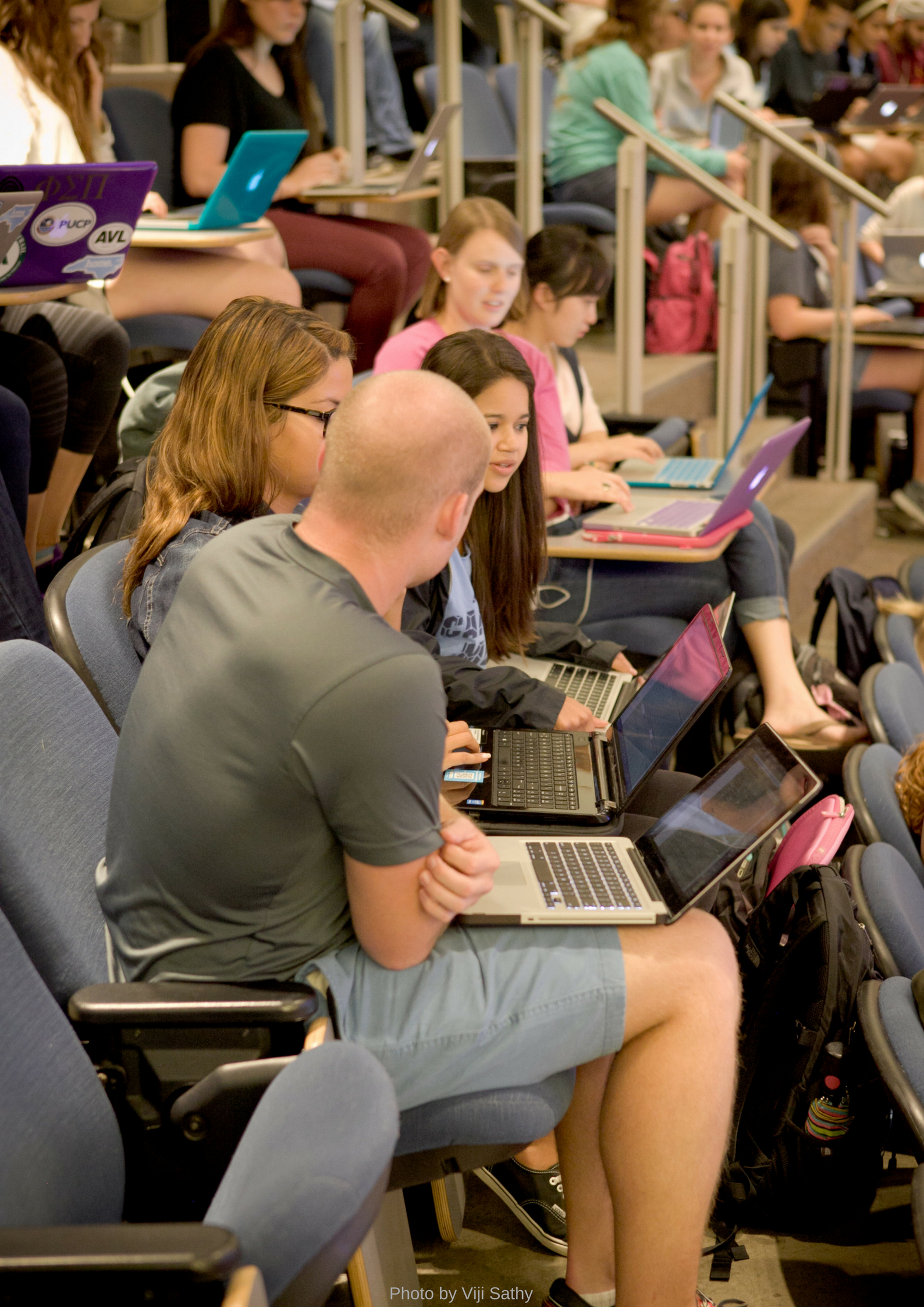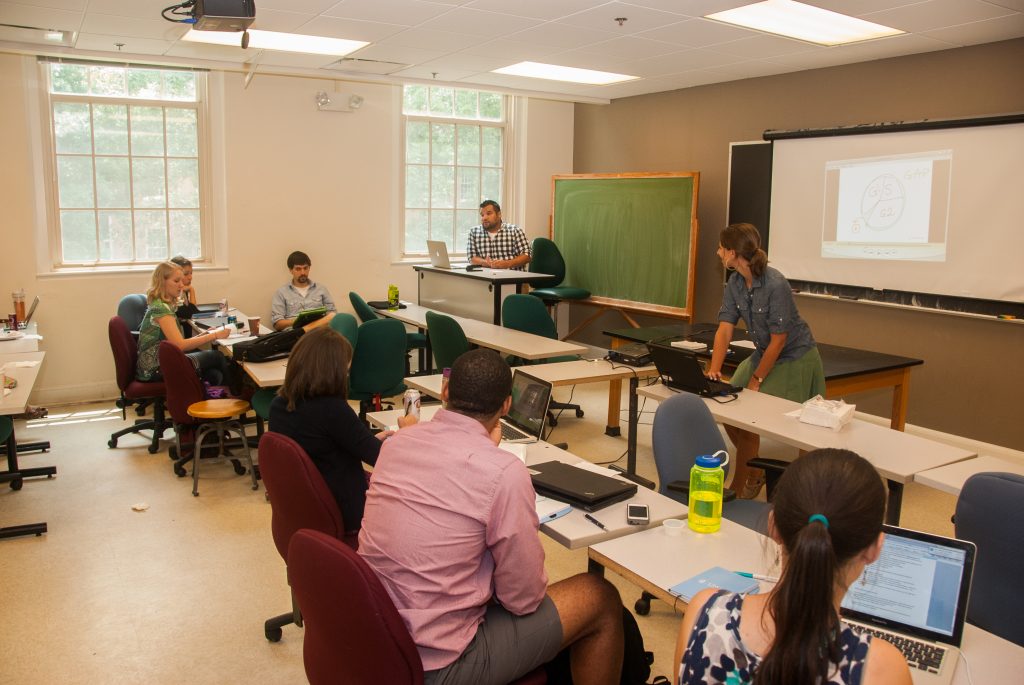The individualized, significant teaching experience will typically occur in the final semester of their certificate training. Teaching internships may be coordinated independently or through existing programs on campus.
These capstone teaching internships are typically proposed by the trainee or coordinated collaboratively with the Program Coordinator/Leadership Team. Each teaching internship will be evaluated on a case-by-case basis by the Leadership Team (Director, Co-Director) for approval, including the criteria of magnitude of the intern’s teaching experience, role, and responsibilities and formal guided teaching mentorship between teaching intern/supervisor.
Examples teaching internships that could be considered include:
- Immersion Program to Advance Career Training (ImPACT) Internships
- Graduate School Bland summer fellowships
- departmental or individually arranged internships
- teaching assistantships or adjunct teaching experiences (with prior approval)
- other approved mentored teaching experiences
Certificate applicants may choose to customize the experience though a variety of internship programs or teaching experiences coordinated individually or via other campus offerings with prior approval. Internship programs and teaching experiences not yet approved may also be considered as fulfilling the experiential mentored teaching experience by request if they meet similar magnitude and mentorship criteria.
Purpose: The internship experience is intended to give Certificate participants the opportunity to implement best practices in science education, and to gain experience in a classroom setting. Additionally, this provides an opportunity to experience the culture and atmosphere of different types of institutions for potential future careers (e.g., research institutions vs. small liberal arts college vs. community college, private vs. public institutions; varied size of institution). Ideally this requirement would be completed at a local institution other than UNC Chapel Hill (though not required) with an identified teaching mentor at the local institution. This may be completed through a variety of internship programs or other mentored teaching experiences (approved by request, reviewed by the Leadership Team).
Individual Significant Teaching Experience (magnitude, mentorship): The Teaching Internship may include a combination of leading lab and/or lecture courses (as fits best with the intern’s previous teaching experience). Ideally, the intern should be the Instructor of Record (or Co-Instructor) for either a lab or a lecture course, with their mentor’s assistance. This could also include guest lectures (i.e., in mentor’s lecture, or in mentor’s other course). The magnitude of time should be “significant” as determined by the Leadership Team. For example, including face-to-face, course prep, etc. the individual teaching experience could be measured as the equivalent of approximately 160 hours. Alternatively, this could be defined by level of responsibility which could range from teaching one full course (lab or lecture), to one half of a course (if co-taught); or co-teaching a smaller portion of two or three courses (if multiple, ideally with some continuity of teaching mentor). The individual significant teaching experience should be overseen by 1-2 formal teaching mentors who agree to train and supervise the Certificate candidate.
Expectations (“scope of work”). Careful planning with clearly defined expectations should be discussed and documented, including number of hours expected for face-to-face classroom time/prep time (on-site vs. remotely; lecture vs. lab prep; office hours, if required; start and end dates of teaching experience; etc.) along with specified responsibilities of the student instructor. A 1-2 page document (e.g., “scope of work”) should detail the planned experiences and/or documents that the student will create as part of their teaching experience (e.g., number of lectures/lab session taught; deliverables such as: assignments, assessment, syllabus, or portions thereof). It is highly recommended that the intern request/coordinate opportunities to receive student evaluations (at minimum for end of course; mid-semester as well, if available) and to use this feedback toward the reflective learning process (e.g., to document evaluations, plan any changes, and reflect in teaching portfolio). Planning meetings and mentoring time should also be built into the document to the “scope of work” document to ensure the best possible experience for interns. Teaching experiences are typically completed in the fall, part time, over a full semester of 14-16 weeks; but could also be full or part-time combinations (e.g., shorter duration 4-6 week courses over the summer). Any scope of work document should include this information and be signed/validated by all parties (student/intern, teaching mentor/internship supervisor, and student’s advisor). Review and approval by all parties is intended to be sure that expectations are clear. It is recommended that the proposed teaching experience be informally be evaluated by program leadership prior to the start of the teaching experience to obtain pre-approval as the individual significant teaching experience for the Certificate program. Once approved, this will be noted on the checklist and confirmed as “complete” at the conclusion of the experience.
Teaching Observation (1 session): At least one teaching observation should be formally completed, including written feedback from the trainee’s teaching mentor (pre- and post- meetings recommended). This will typically be the internship sponsor (teaching mentor), but could also be another faculty member or teaching advisor (approved by request). This does not need to be submitted separately, as long as its included in the “scope of work” document.

